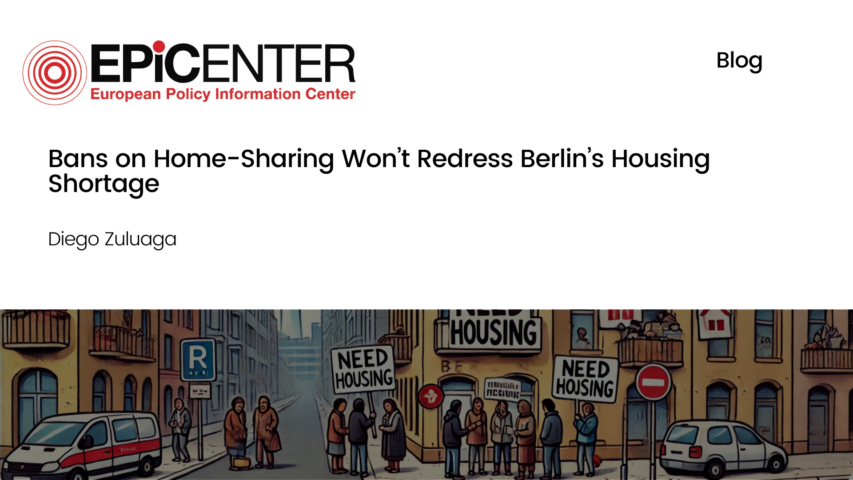Bans on Home-Sharing Won’t Redress Berlin’s Housing Shortage

Bans on Home-Sharing Won’t Redress Berlin’s Housing Shortage
Diego Zuluaga // 04.05.2016
A law banning short-term apartment rentals just came into force in Berlin. The measure, which was passed in 2014 but only entered into force on 1 May, is aimed at releasing housing for Berliners. In the words of Andreas Geise, the city’s head of urban development, the law is “a necessary and sensible instrument against the housing shortage in Berlin.”
In fact, the ban will do little to bring about more – and more affordable – dwellings for local residents. All it will achieve is to prevent homeowners from making an income by letting their properties to people looking for cheap temporary accommodation. In short, it will make some people worse off while failing to make anybody else better off.
To understand why this is the case, it is important to recognise how and why home-sharing business models such as Airbnb have emerged, and the purpose they serve in an increasingly varied market for temporary accommodation.
Home-sharing is an example of the sharing economy at work. A report for the European Parliament has defined the sharing economy as “the use of digital platforms or portals to reduce the scale for viable hiring transactions or viable participation in consumer hiring markets […] and thereby reduce the extent to which assets are under-utilised.” In other words, this phenomenon involves the use of new technologies and market innovations to reduce transaction costs and thereby make a greater number of economic exchanges possible, to the benefit of both asset owners and prospective users of those assets.
To illustrate, consider an example from the case at hand. It used to be that homeowners with a spare room, or who were planning to spend some time abroad, did not have cheap and reliable means of letting their property. Owners faced three types of barriers:
1. the cost of searching and sorting through the available options;
2. a lack of trust between owners and potential users, who normally do not know each other in advance;
3. the lack of a convenient and dependable means of payment.
Some homeowners would use agencies to help them overcome these barriers, but high commissions and management fees made this option unattractive to those letting their homes only sporadically and for relatively low amounts. The result was that available homes went under-utilised: mutually beneficial transactions did not take place because of the high costs involved.
Enter home-sharing platforms such as Airbnb. By providing a venue in which asset owners and asset users can meet, platforms dramatically cut search costs. Trust is enhanced through comprehensive review mechanisms for both parties to the transaction. It is complemented by platform-sponsored insurance. Payment is made through the platform, which handles fraud and other user complaints. All this is achieved at relatively low cost, making it worthwhile for the first time for many homeowners to let their property.
What home-sharing does then is expand the housing stock available to let. It makes those dealing through home-sharing platforms better off – because they could not efficiently transact before – without making anybody else worse off – because platforms rely primarily on under-utilised housing assets, not on the rental stock that was available and on offer before the advent of the sharing economy.
Proponents of the Berlin ban might argue that home-sharing platforms have the potential to attract homes which would previously have been let in the conventional rental market. But it is unclear why homeowners would tend to prefer short-term lets – which involve higher administrative costs – to more secure long-term ones. It could be that short-term lets to tourists fetch higher prices than long-term lets to residents. Or it could be that homeowners seek the flexibility of short-term lets. Either way, it is by no means obvious that a ban would result in the stock currently available for short-term lets shifting to the long-term rental market.
Rather, what we are likely to see is a reduction in the overall housing stock available. It will amount to a return to the days when no online platforms existed to enable transactions between willing users. This would be a sad development for a city like Berlin, which likes to see itself as one of Europe’s most tech- and startup-friendly hubs.
A ban on short-term lets is no solution to shortages of urban housing. European capitals should be proud and happy that they attract increasing numbers of people, and they should enable the building of new housing to meet the additional demand. Above all, they should abstain from misguided policies such as rent controls, which have amply been shown to worsen tenant conditions and discourage the development of rental markets in the long term.
Berlin, of all places, should be able to adapt to an increased population more easily than its peers, given that its population peaked at 4.3 million before the outbreak of WWII and now stands at 3.5 million. Furthermore, the city’s forty-year partition means that much infrastructure and public transport are duplicated.
The bottom line is that the ban on short-term lets is a red herring and will probably make things worse, not better, for Berliners and visitors alike.
Diego Zuluaga is Head of Research at EPICENTER. Our briefing “Regulatory approaches to the sharing economy” can be found here. Our briefing “Understanding online platforms” can be found here.
EPICENTER publications and contributions from our member think tanks are designed to promote the discussion of economic issues and the role of markets in solving economic and social problems. As with all EPICENTER publications, the views expressed here are those of the author and not EPICENTER or its member think tanks (which have no corporate view).



